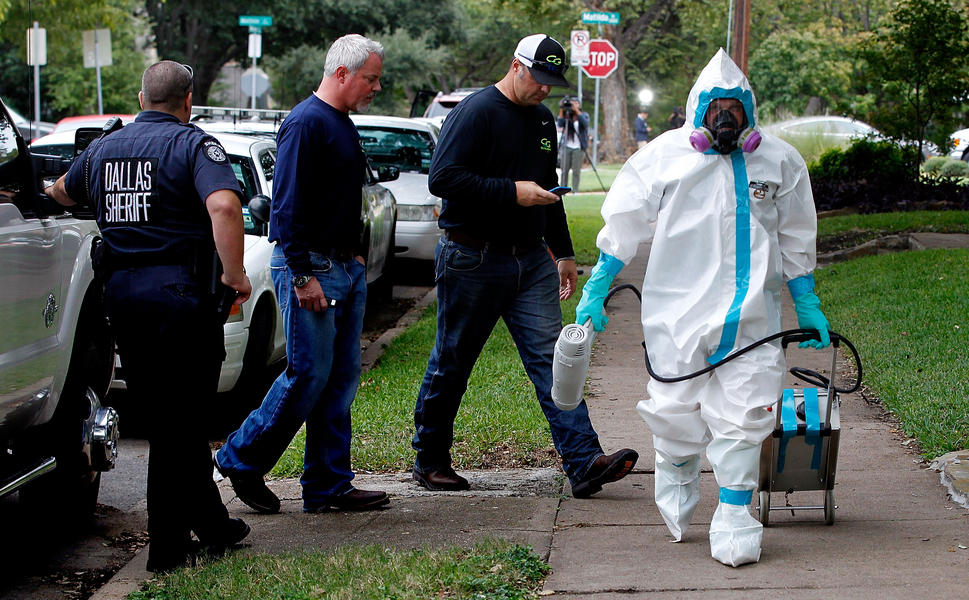CDC's 'protocol breach' explanation for new Texas Ebola case smacks of scapegoating, critics say


A free daily email with the biggest news stories of the day – and the best features from TheWeek.com
You are now subscribed
Your newsletter sign-up was successful
A female nurse in Dallas was somehow infected with the Ebola virus while caring for Thomas Eric Duncan, a Liberian man who came to the U.S. infected with the disease. The big question public health officials — and the public — is asking is: How did this happen? On Sunday, Centers for Disease Control and Prevention (CDC) Director Dr. Thomas Frieden said that "clearly there was a breach in protocol" at Texas Health Presbyterian Hospital Dallas.
Some nurses and infectious-disease experts say Frieden's explanation amounts to blaming the victim, when the real lesson is that U.S. hospitals are clearly unprepared to handle Ebola. "You don't scapegoat and blame when you have a disease outbreak," National Nurses United's Bonnie Castillo, an RN and disaster relief expert at the U.S. professional nursing organization and union, tells Reuters. "We have a system failure. That is what we have to correct."
The nurse was wearing recommended protective gear, the Dallas hospital says, but health care workers can get infected with just tiny slips, like if they brush against an infected surface or accidentally touch the wrong part of their hazmat suit, then take off their suit the wrong way. Hospitals haven't done nearly enough to train their staff about Ebola protocols, National Nurses United says, and other experts agree.
The Week
Escape your echo chamber. Get the facts behind the news, plus analysis from multiple perspectives.

Sign up for The Week's Free Newsletters
From our morning news briefing to a weekly Good News Newsletter, get the best of The Week delivered directly to your inbox.
From our morning news briefing to a weekly Good News Newsletter, get the best of The Week delivered directly to your inbox.
But education isn't enough — there also needs to be oversight, Sean Kaufman, of Behavioral-Based Improvement Solutions, tells Reuters. "Doctors and nurses get lost in patient care. They do things that put themselves at risk because their lens is patient-driven." In Dallas, he adds, "I suspect no one was watching to make sure the people who were taking care of the patients were taking care of themselves."
A free daily email with the biggest news stories of the day – and the best features from TheWeek.com
Peter has worked as a news and culture writer and editor at The Week since the site's launch in 2008. He covers politics, world affairs, religion and cultural currents. His journalism career began as a copy editor at a financial newswire and has included editorial positions at The New York Times Magazine, Facts on File, and Oregon State University.
-
 6 exquisite homes with vast acreage
6 exquisite homes with vast acreageFeature Featuring an off-the-grid contemporary home in New Mexico and lakefront farmhouse in Massachusetts
-
 Film reviews: ‘Wuthering Heights,’ ‘Good Luck, Have Fun, Don’t Die,’ and ‘Sirat’
Film reviews: ‘Wuthering Heights,’ ‘Good Luck, Have Fun, Don’t Die,’ and ‘Sirat’Feature An inconvenient love torments a would-be couple, a gonzo time traveler seeks to save humanity from AI, and a father’s desperate search goes deeply sideways
-
 Political cartoons for February 16
Political cartoons for February 16Cartoons Monday’s political cartoons include President's Day, a valentine from the Epstein files, and more
-
 Trump HHS slashes advised child vaccinations
Trump HHS slashes advised child vaccinationsSpeed Read In a widely condemned move, the CDC will now recommend that children get vaccinated against 11 communicable diseases, not 17
-
 FDA OKs generic abortion pill, riling the right
FDA OKs generic abortion pill, riling the rightSpeed Read The drug in question is a generic version of mifepristone, used to carry out two-thirds of US abortions
-
 RFK Jr. vaccine panel advises restricting MMRV shot
RFK Jr. vaccine panel advises restricting MMRV shotSpeed Read The committee voted to restrict access to a childhood vaccine against chickenpox
-
 Texas declares end to measles outbreak
Texas declares end to measles outbreakSpeed Read The vaccine-preventable disease is still spreading in neighboring states, Mexico and Canada
-
 RFK Jr. shuts down mRNA vaccine funding at agency
RFK Jr. shuts down mRNA vaccine funding at agencySpeed Read The decision canceled or modified 22 projects, primarily for work on vaccines and therapeutics for respiratory viruses
-
 Measles cases surge to 33-year high
Measles cases surge to 33-year highSpeed Read The infection was declared eliminated from the US in 2000 but has seen a resurgence amid vaccine hesitancy
-
 Kennedy's vaccine panel signals skepticism, change
Kennedy's vaccine panel signals skepticism, changeSpeed Read RFK Jr.'s new vaccine advisory board intends to make changes to the decades-old US immunization system
-
 Kennedy ousts entire CDC vaccine advisory panel
Kennedy ousts entire CDC vaccine advisory panelspeed read Health Secretary RFK Jr. is a longtime anti-vaccine activist who has criticized the panel of experts
